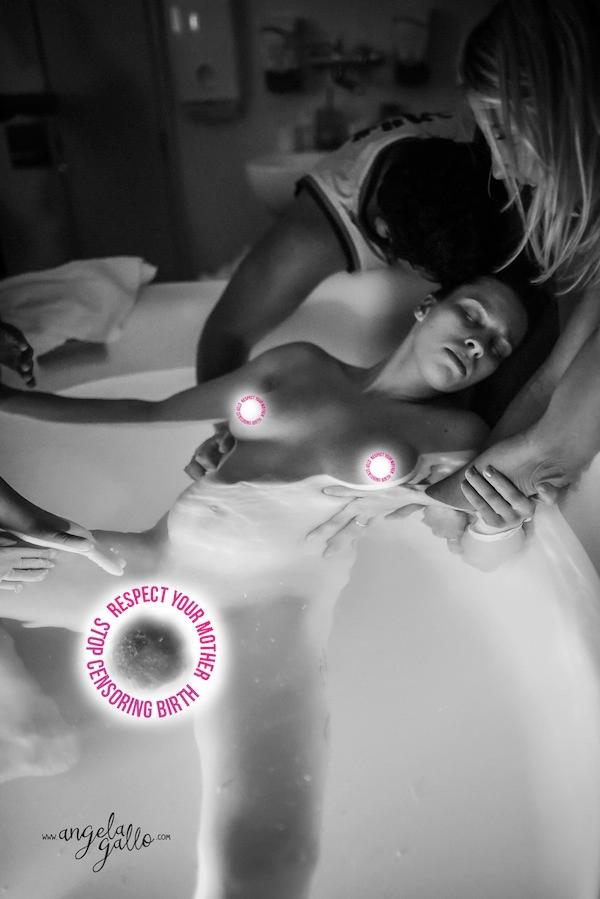Under the community standards for many social media sites, a baby crowning through a mother's vagina is defined as explicit, or even pornographic. Australian-based birth photographer and doula Angela Gallo is all too familiar with messages telling her as much. Every time she uploads photographs from the births of families she works with, they get taken down.Gallo is on strike two from Facebook, one away from having her account shut down. She's already lost her Instagram account with more than 8,000 followers. It's especially frustrating for her since her work is partially about spreading the notion that there's nothing icky about birth.
Advertisement
Recently we talked to Angela about stigma, beauty, and satisfying censors with photoshopped lens flairs.VICE: What do you think is the main issue with social media censoring your images?
Angela Gallo: Look, I understand that not everybody wants to see boobs and vaginas on their timelines, but there are alternatives and there has to be a compromise. Even cesarean birth images are getting banned because they're "explicit acts of violence and aggressiveness." Censoring is really symptomatic of a system that needs addressing in general, where porn is more normal than birth, but birth is called porn.How do you think changing attitudes towards birth would change the experience of birth?
If we look at mainstream culture, birth is portrayed as very surgical, cold, sterile, and dramatic. Women are conditioned since they are young to believe that this is what birth is, and as they get older they still believe this in a subconscious level. What I am hoping to do is to use these images to challenge what they think is normal and how they can frame it in a positive way. If I do that, I can hopefully remove the fear and anxiety that is associated with birth.
Angela Gallo: Look, I understand that not everybody wants to see boobs and vaginas on their timelines, but there are alternatives and there has to be a compromise. Even cesarean birth images are getting banned because they're "explicit acts of violence and aggressiveness." Censoring is really symptomatic of a system that needs addressing in general, where porn is more normal than birth, but birth is called porn.How do you think changing attitudes towards birth would change the experience of birth?
If we look at mainstream culture, birth is portrayed as very surgical, cold, sterile, and dramatic. Women are conditioned since they are young to believe that this is what birth is, and as they get older they still believe this in a subconscious level. What I am hoping to do is to use these images to challenge what they think is normal and how they can frame it in a positive way. If I do that, I can hopefully remove the fear and anxiety that is associated with birth.
How have people on social media reacted to your work?
It's been interesting. Because I understand it can be graphic and of a sensitive nature. For the most part I have received amazing responses from women opening up and saying things like, "I orgasmed at birth, but for ten years nobody has known, because I felt so ashamed of my body and myself and seeing these images has made me feel good, excited, and normal." Things like that really push me.
It's been interesting. Because I understand it can be graphic and of a sensitive nature. For the most part I have received amazing responses from women opening up and saying things like, "I orgasmed at birth, but for ten years nobody has known, because I felt so ashamed of my body and myself and seeing these images has made me feel good, excited, and normal." Things like that really push me.
Advertisement
So where do you get the most resistance from?
There are some ridiculous comments, but most resistance is on the nature of birth itself. The most common comment I get is like, "Oh, no, not this shit again, women want to meddle." We have been doing this since the beginning of time, it's not a big deal, it's bullshit.Don't you think the digital world has also helped to break through these stereotypes?
Definitely. Forty years ago men weren't allowed in the birth room. Women couldn't see their placentas and birth was something you did behind closed doors. So we are slowly and surely breaking away stereotypes. For example, with menstruation there are now women using tampons to make art, saying: "You know what, this is a part of me, this is who I am, I also make babies, I birth a placenta and I want this documented."
There are some ridiculous comments, but most resistance is on the nature of birth itself. The most common comment I get is like, "Oh, no, not this shit again, women want to meddle." We have been doing this since the beginning of time, it's not a big deal, it's bullshit.Don't you think the digital world has also helped to break through these stereotypes?
Definitely. Forty years ago men weren't allowed in the birth room. Women couldn't see their placentas and birth was something you did behind closed doors. So we are slowly and surely breaking away stereotypes. For example, with menstruation there are now women using tampons to make art, saying: "You know what, this is a part of me, this is who I am, I also make babies, I birth a placenta and I want this documented."

How has censorship affected your career?
Most recently I had a photo that got a honorable mention in the International Association of Birth Photographers. It is basically a woman who is crowning. I lost a lot of coverage because it was showing boobs and vagina, and I got banned from Instagram and Facebook.So what did you do?
I modified the image with bright lights in her boobs. I thought that it was so funny that it was less offensive when it is pretty obvious that those are boobs. Then I wrote around her vagina, "Respect your mother, stop censoring birth." My point is that we all came from the same place, whether it was surgical or vaginal—you came out of your mother and I find it so disrespectful that we constantly censoring and shaming our mothers.
Most recently I had a photo that got a honorable mention in the International Association of Birth Photographers. It is basically a woman who is crowning. I lost a lot of coverage because it was showing boobs and vagina, and I got banned from Instagram and Facebook.So what did you do?
I modified the image with bright lights in her boobs. I thought that it was so funny that it was less offensive when it is pretty obvious that those are boobs. Then I wrote around her vagina, "Respect your mother, stop censoring birth." My point is that we all came from the same place, whether it was surgical or vaginal—you came out of your mother and I find it so disrespectful that we constantly censoring and shaming our mothers.
Advertisement
What is your plan to fight back this censorship in the long run?
This was a huge reason I want to do my photo book and the online campaign because I want to use visual media as a platform, but I have hit a brick wall with social media. I cannot do what I actually wanted to do because every image is getting flagged and this doesn't fit my purpose to produce very honest accounts of birth.Still, I do not want to lose my account, as it is a very important place to discuss things with people, but I know I have to do it from a different angle, I can't rely on Instagram or Facebook to support this message.See more of Gallo's work here and below.Interview by Laura Rodriguez Castro. Follow her on Twitter.
This was a huge reason I want to do my photo book and the online campaign because I want to use visual media as a platform, but I have hit a brick wall with social media. I cannot do what I actually wanted to do because every image is getting flagged and this doesn't fit my purpose to produce very honest accounts of birth.Still, I do not want to lose my account, as it is a very important place to discuss things with people, but I know I have to do it from a different angle, I can't rely on Instagram or Facebook to support this message.See more of Gallo's work here and below.Interview by Laura Rodriguez Castro. Follow her on Twitter.
